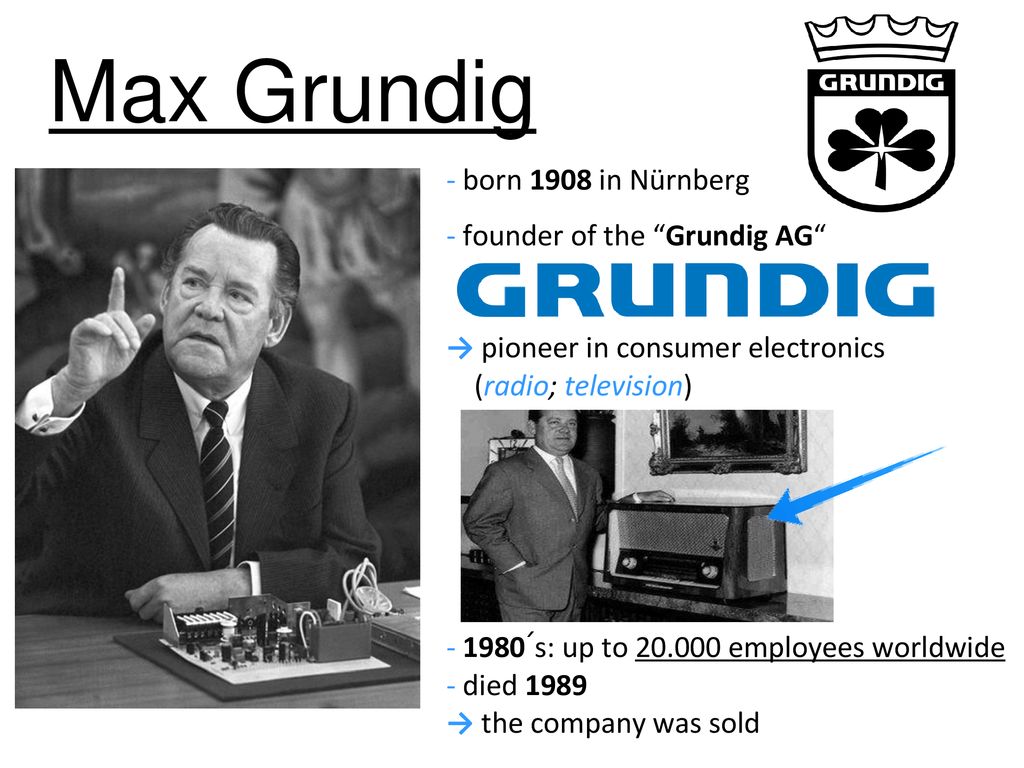How the poor German boy became rich: Who is Max Grundig?
Born in Nuremberg, the son of a warehouse clerk, Grundig grew up under harsh conditions. When Max's father died when he was twelve, his mother took up factory work for a low wage to support herself and her four siblings.

Patriarchal German entrepreneur Grundig became Europe's leading radio manufacturer after World War II. However, in the 80s, its situation was shaken by the products of rival companies from the Far East.
Born in Nuremberg, the son of a warehouse clerk, Grundig grew up under harsh conditions. When Max's father died when he was twelve, his mother took up factory work for a low wage to support herself and her four siblings.
After graduating from school, Grundig studied with a plumber in his hometown and completed his apprenticeship in 1925.
When Grundig turned 19, he started managing the branch of the plumbing company he grew up in in the neighboring city of Fürth. His greatest passion was for radio, whose technique he was particularly interested in, which began regular broadcasting in Germany in 1923.
Max Grundig (7 May 1908 – 8 December 1989) was the founder of electronics company Grundig AG. Grundig was raised by his parents in Nuremberg where he delayed his final school exams (Abitur) and completed training as an electrician. Grundig's father died when he was 12 and his mother had to support her five children on a factory wage. Young Grundig started his working life as a plumber's apprentice.
Grundig, who had strong manual dexterity, founded the radio sales company Fürth Grundig & Wurzer with an acquaintance in 1930. The store, which specialized in selling transformers for receiving radio broadcasts, soon became profitable. One year before the outbreak of the Second World War, their turnover exceeded the one million limit due to high demand. In the same year, Grundig separated from his first wife and married singing artist Anneliese Jürgensen.
Grundig, which produced parts for radio stations during World War II, started selling measuring instruments for radio receivers after 1945. Since the allies who took power in Germany banned the sale of radio devices in the country, Grundig decided to sell a Baukasten (assembly box) that could be sold tax-free. With this radio mounting box, which he named "Heinzelmann" (Fairytale Dwarf), he was able to get ahead of his competitors in the radio equipment market.
Grundig's first large factory was established in Fürth in 1947. Grundig, which turned 40 in the year of the monetary reform (Waehrungsreform) in Germany, achieved success with the production of "Weltklang" (Voice of the World), a model for the future. This new device allowed easier use with special buttons and volume adjustment.
Apart from this, Grundig took a great chance economically by not only including medium and long wave fields in production but also taking ultra-short waves into account for the first time. Since the 1948 Copenhagen Wave Plan, which was implemented in Germany after 1950, included almost no room for medium and long wave frequency alternation, German radio stations were forced to increasingly turn to UKW (ultra short wave).
In the following years, Grundig became Europe's largest radio equipment manufacturer. In 1951, audio tape went into mass production. Christmas 1952 was the hour when television was born in Germany. Grundig started production of TV receivers in the same year. In the years that followed, Grundig was able to gradually reduce the prices of his own products and ensure that the number of customers, turnover, and profits constantly increased.
Having established his own bank, Grundig opened many branches in his own country and was also successful in foreign countries (among others, the USA in 1959; Northern Ireland in 1960; Sweden in 1964; Portugal, Italy, and France in 1966).
The Max Grundig Foundation, which he established in 1970, became the largest shareholder (93.5%) of Grundig Joint Stock Company two years later. Grundig, who assumed the presidency of the foundation and the chairman of the board of directors of the personnel union, made it difficult for the officers in executive positions to maintain their positions in the company with his authoritarian management style.
As a result, there was a constant fluctuation in the management, and this continued until Grundig, who was tired of the conflict, took over the chairmanship of the board himself in 1982. Due to cheap exports from the Far Eastern media market, Grundig lost its top position in Europe, which it had maintained for many years, and started to lose money towards the end of the 70s.
He tried to fight against this after 1979 by collaborating with the Dutch company Philips. Grundig's proposal to unite all European manufacturers under his own management was not accepted.
Grundig made his third marriage in 1981, with French woman Chantal Rublert, and had a child with her (he also had a child from his first marriage). Philips increased its stake in the Franconian company in the mid-80s and took over the management of the company in April 1984. Grundig, 75, continued his chairmanship of the Max Grundig Foundation and began establishing a luxury hotel chain. Grundig died in 1989, at the age of 81, at his home in Baden-Baden, where he spent his old age.
